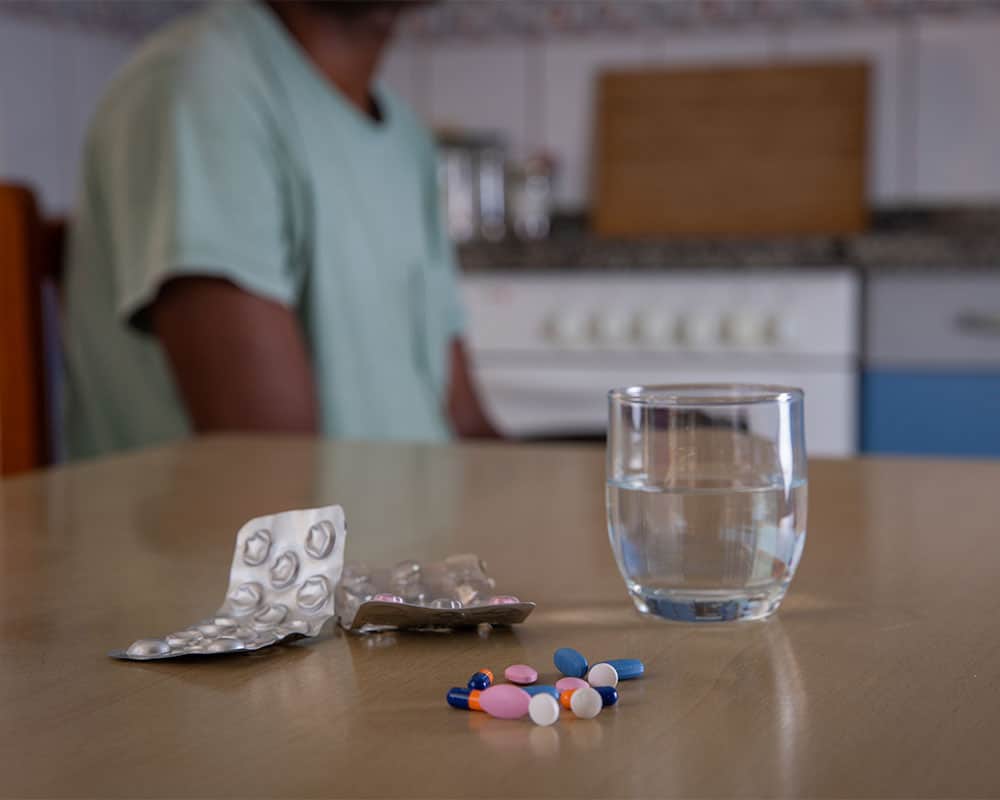Can You Overdose on Xanax? Symptoms, Treatment, and What to Do

- You can overdose on Xanax, and how much Xanax it takes to overdose is different from person to person
- Life-threatening dosages of Xanax can be deadly when mixed with other drugs, and mixing alcohol and Xanax may require emergency attention
- Symptoms of a Xanax overdose may include excessive drowsiness, confusion, altered mental status, poor coordination, slurred speech, slower breathing, rapid heartbeat, and tremors
- If you suspect a Xanax overdose, call 911 or Poison Control immediately
Xanax is the trade name for alprazolam, a sedative-hypnotic medication. It is also a potent central nervous system depressant. Xanax works in the brain to slow and reduce nerve activity, thereby activating a state of calm.[1]
It does this by increasing the amount of GABA in the central nervous system (CNS). GABA (Gamma-Aminobutyric Acid) works like brakes, slowing brain activity. When the brain slows down, you slow down, too.
Unfortunately, in calming the brain, Xanax also slows breathing, making your lungs less effective. Shallow breathing deprives the body of oxygen, allowing toxins to accumulate and can also lead to brain damage.[2]
The presence of other drugs worsens this effect. All medicines that slow the nervous system are particularly life-threatening. You can overdose on Xanax and any sedative or depressant.[3] When combined with other drugs, any amount of Xanax can be dangerous. Mixing any amount of alcohol or an opioid with Xanax can be harmful, and even fatal. [4]
What is Xanax? How Much Xanax is Safe?
Xanax belongs to the benzodiazepine family of non-narcotic medications. It’s a prescription drug you can overdose on, by itself or mixed with other drugs. Doctors prescribe Xanax to control anxiety disorders, help people relax, and manage panic disorders.[5]
Can You Overdose on Xanax? How Much Xanax Does It Take?
The amount of Xanax needed to cause an overdose varies from person to person. These are some of the factors that determine how much Xanax is too much.
- If Xanax were taken alone or in combination with another drug
- Medical conditions, such as a heart, kidney, or liver condition
- Presence of other prescription drugs, like antidepressants
- Weight
- Age
Disorder-Specific Xanax Dosages
The typical prescribed amount is usually between 0.75 and 1.5 milligrams (mg) daily and per disorder; prescribed amounts vary, including:[6]
- Panic Disorder: An extended-release form of Xanax, Xanax XR, is often given for panic disorder. Typically, 0.5 mg, three times a day. A doctor may increase doses by up to 1 mg per day every 3-4 days.
- Generalized Anxiety Disorder (GAD): Typically, 0.25 to 0.5 mg, three times a day, usually not more than 4 mg per day.
- Older Adults: A lower starting dose of 0.25 mg, 2 or 3 times a day.
What Are The Symptoms of a Xanax Overdose?
When a person overdoses on Xanax by itself, a range of symptoms, from mild to more serious, may appear in the following ways: [7]
Symptoms of a mild xanax overdose
- Excessive drowsiness
- Confusion
- Altered mental status
- Poor coordination and impaired movement (ataxia)
- Slurred speech
- Slower breathing
- Rapid heartbeat
- Tremors
Severe symptoms of Xanax Overdose or high xanax toxicity include:
- hallucinations
- seizures
- chest pain
- difficulty breathing
- abnormal heart rhythm
- coma
- respiratory arrest
Respiratory arrest is the most severe side effect of a Xanax overdose. It happens when a person’s breathing gets so slow and shallow that it stops. Without medical help, respiratory arrest is fatal.[8]
Xanax and Other Benzodiazepines Overdose Symptoms
All benzos are CNS depressants; they slow nerve activity in the brain. Overdosing on any benzo shares similar effects to those of a Xanax overdose.
When combined with another benzodiazepine, the risk of overdose increases.
- Examples: Valium (diazepam), Librium (chlordiazepoxide), Ativan (lorazepam), Xanax (alprazolam), Klonopin (clonazepam)
- Symptoms: Severe sedation, confusion, extremely slow, shallow breathing
- Danger Level: Very high
Xanax and Alcohol Overdose Symptoms
Alcohol and Xanax are an extremely dangerous mix requiring medical attention. Any dosage of Xanax and even a small amount of alcohol may require medical treatment.
- Symptoms: Respiratory depression, imbalance, blackouts, injuries, and even death [9]
- Danger Level: Extremely high from respiratory depression
- What to Do: Call 911. Do not leave the individual alone, and avoid giving anything orally. People often vomit during an alcohol & Xanax overdose.
Xanax and Opioid Overdose Symptoms
About 83% of benzodiazepine-involved overdose deaths in the U.S. between 2000 and 2019 also involved opioids.[10] Opioids and Xanax magnify each other’s effects. Together, they can slow down a person’s breathing to the point where it stops completely.[11] Examples of common opioids include fentanyl, oxycodone, codeine, heroin, morphine, and tramadol.[12]
Mixing Xanax and opioids of any sort, prescribed or illicit, presents an immediate life-threatening situation. The opioid drug fentanyl is responsible for most overdose deaths in the US. It’s incredibly strong and is often mixed with illicit (street) Xanax.
Symptoms of Xanax and Opioid Overdose
Mixing Xanax and opioids presents a high risk of death. Any of these symptoms by itself is sufficient to call 911.
Symptoms include:
- Blue lips
- Cold/clammy skin
- Unconsciousness
- Slow or shallow breathing
- Respiratory failure (a person stops breathing)
What to Do About an Overdose of Xanax and an Opioid
Call 911 and administer naloxone, which treats opioid overdose, if it’s available.[13] Do not leave the person alone. Try to keep them awake. Make sure the individual is on their side, as vomiting during an opioid and Xanax overdose is typical.
Xanax and Stimulant Overdose Symptoms
Stimulants speed up the central nervous system, the opposite of Xanax’s action. Some examples include cocaine, crack cocaine, crystal meth, and amphetamines like Adderall.
When a person mixes stimulants and Xanax, the nervous system becomes confused. The brain attempts to perform two incompatible actions simultaneously: slow down and speed up.
Symptoms include:
- Confusion
- Erratic heartbeat
- Seizures
- Aggressive behaviors
How is Xanax Overdose Treated?
The first step is to get professional medical care. Call 911 and follow the operator’s instructions. Once at the ER, medical professionals ensure that the individual’s breathing is stabilized and maintained.
- IV fluids may also be given to maintain hydration and replenish a person’s nutrients.
- Rarely, a medication called flumazenil may be administered. Flumazenil reverses the effects of Xanax toxicity, but has risks of its own, including seizures.
- Gastric lavage (stomach pumping) isn’t typically used to treat an overdose on Xanax by itself. However, depending on other substances a person may have taken, a physician might order it.
Recovery from Xanax Addiction
Xanax is the 34th most prescribed medication in the US in 2021.[14] Almost 17 million prescriptions for alprazolam were written in 2020.[15] Xanax is highly addictive and has a high potential for misuse.[16]
According to the DSM-5, a sedative, hypnotic, or anxiolytic use disorder involves a pattern of use causing significant distress or impairment, and a person must show at least two of these symptoms within a year to be diagnosed with an addiction:[17]
- Using more Xanax than intended
- Persistent desire or unsuccessful attempts to cut down or stop using Xanax
- Spending excessive time getting, using, or recovering from using the drug
- Cravings or urges to use
- Tolerance (needing more Xanax to get the same effect)
- Withdrawal symptoms
- Using alprazolam to avoid withdrawal symptoms.
- Drug use causes failure at school, at home, or at work
- Continued use despite negative social or relationship effects
- Reduced recreational, work, or social activities due to drug use
- Continued use despite knowing about physical or psychological problems caused or worsened by the drug
Xanax addiction treatment helps people get their lives back. There are many treatment options available to help address your unique needs. Treatment programs offer inpatient, outpatient, and day treatment programs.
Frequently Asked Questions About Xanax Overdose

